Abstract
1. The effects of drugs and altering stimulus parameters on neurogenic responses to electrical field stimulation (EFS) have been investigated in distal and proximal portions of the guinea-pig trachea. 2. In the presence of indomethacin (3 microM) and propranolol (1 microM) two contractile phases were evident in both the proximal and distal trachea. The first rapid phase was abolished by atropine (0.1 microM), whereas the prolonged, second phase was abolished by capsaicin (10 microM) pretreatment. Tetrodotoxin (3 microM) abolished the initial response and greatly inhibited the second phase. In proximal trachea this second phase was evident only in 9 of 22 preparations. The addition of the peptidase inhibitor thiorphan (10 microM) however, caused a second phase to be seen in all the proximal tissues examined. 3. The two phases of the contractions to EFS were differentially sensitive to the pulse duration applied. The initial, cholinergic contractions were evident at lower pulse durations than were the prolonged capsaicin-sensitive contractions, with the first phase being approximately 10 fold more sensitive than the second phase. 4. The magnitude of the capsaicin-sensitive contraction to EFS was significantly greater in the distal trachea than in the proximal trachea. This difference prevailed in the presence of thiorphan, an inhibitor of neutral endopeptidase. In contrast, concentration-response curves to capsaicin were similar in segments of proximal and distal trachea. 5. The non-adrenergic non-cholinergic (NANC) relaxant responses were studied in tissues in which excitatory neurogenic responses were pharmacologically abolished by capsaicin and atropine treatment.(ABSTRACT TRUNCATED AT 250 WORDS)
Full text
PDF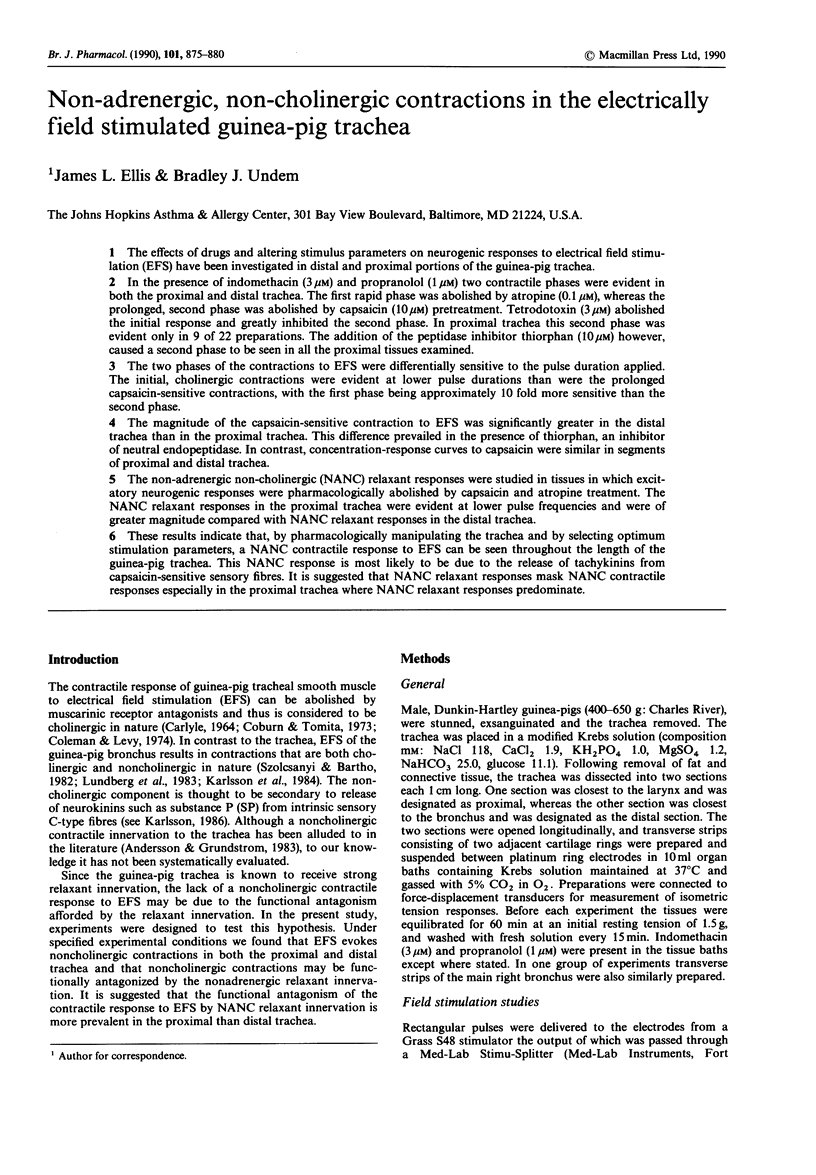
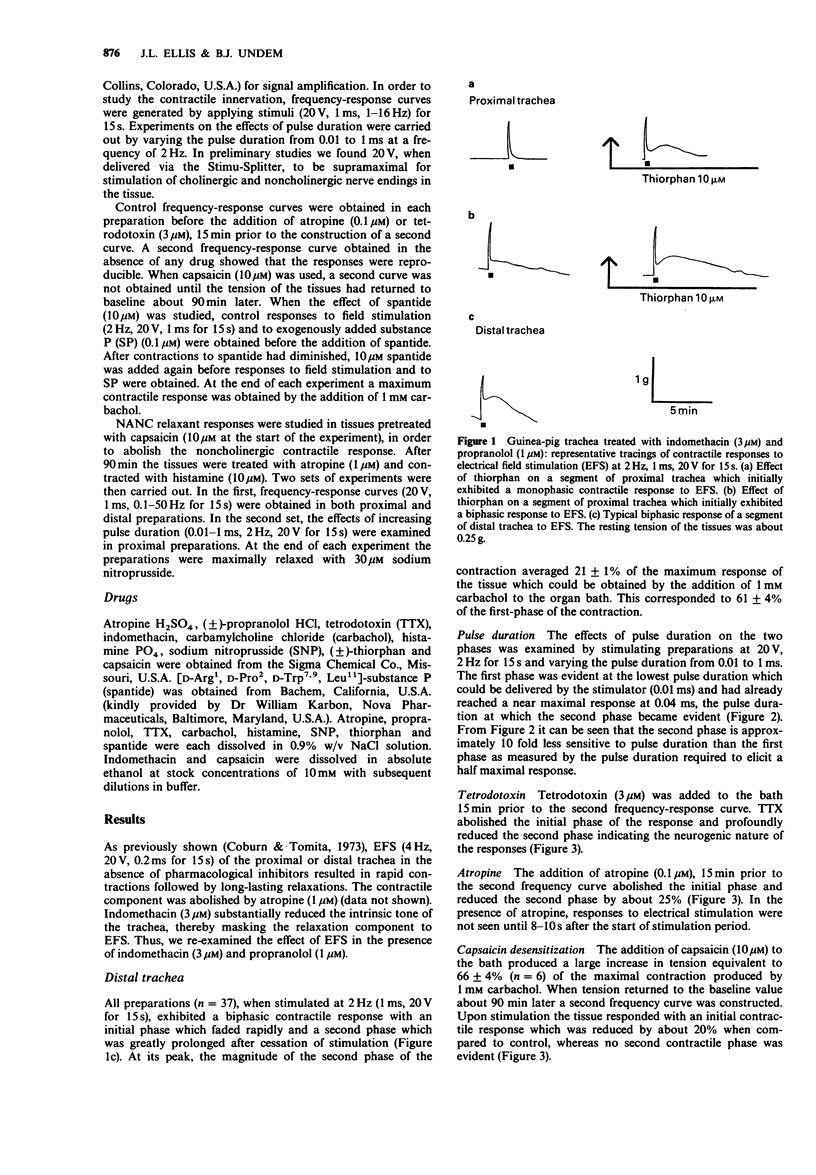
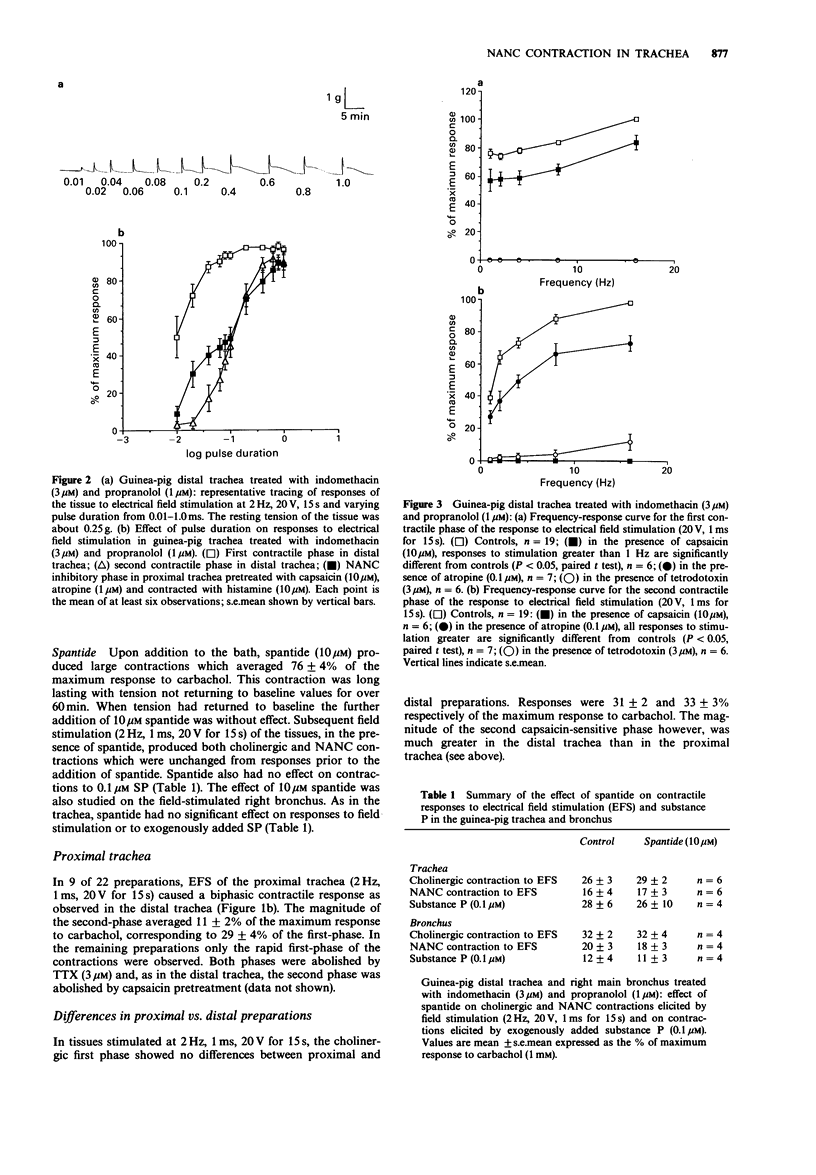
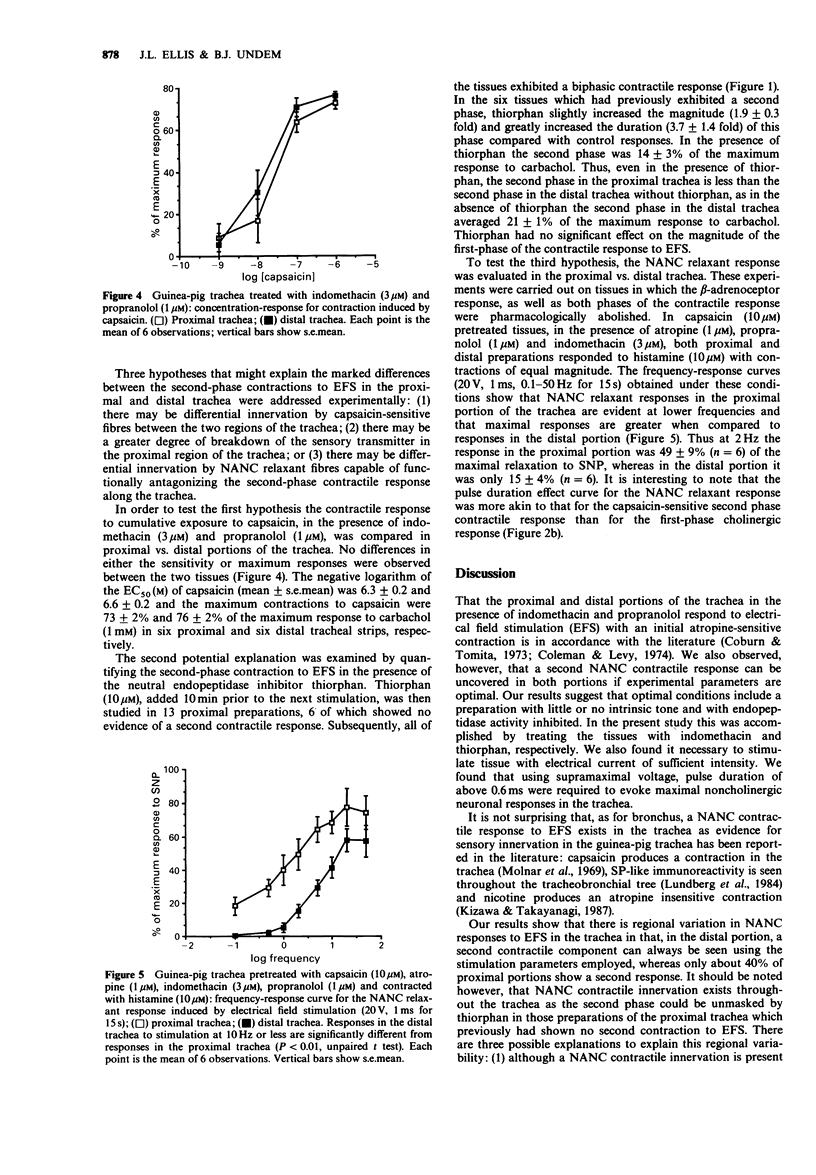
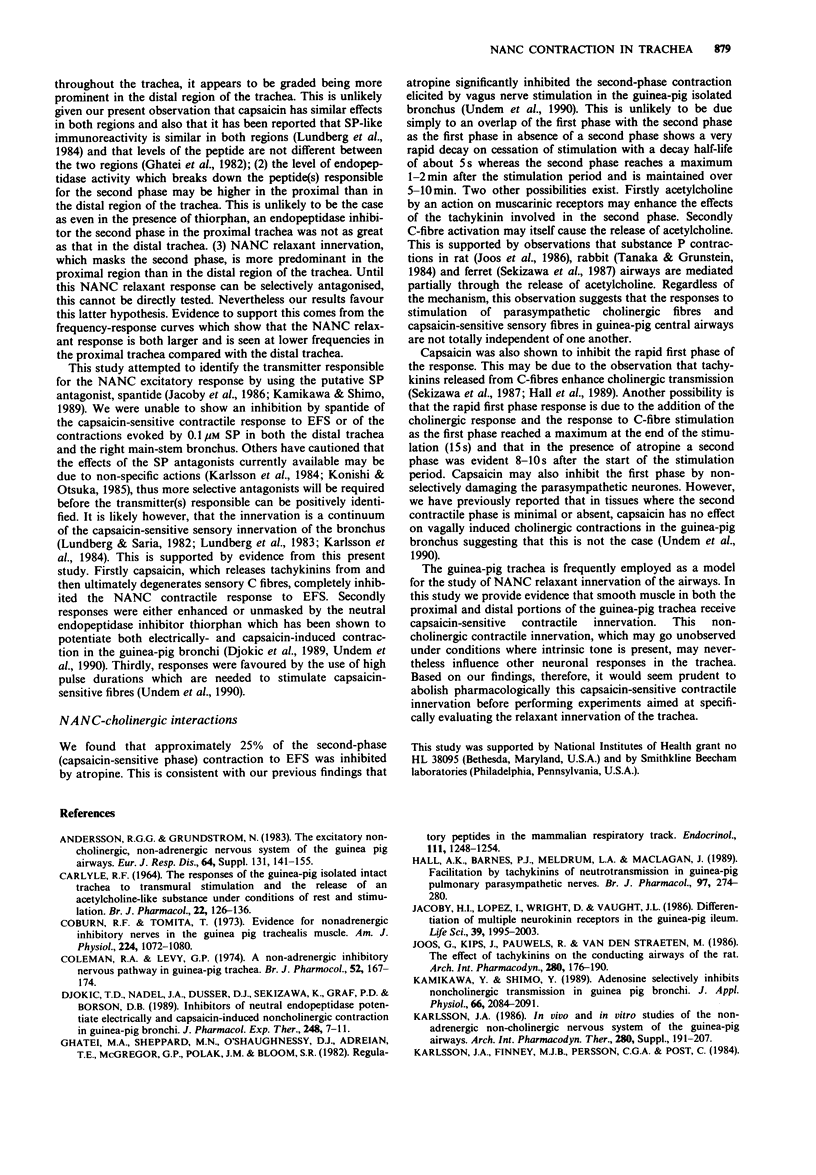
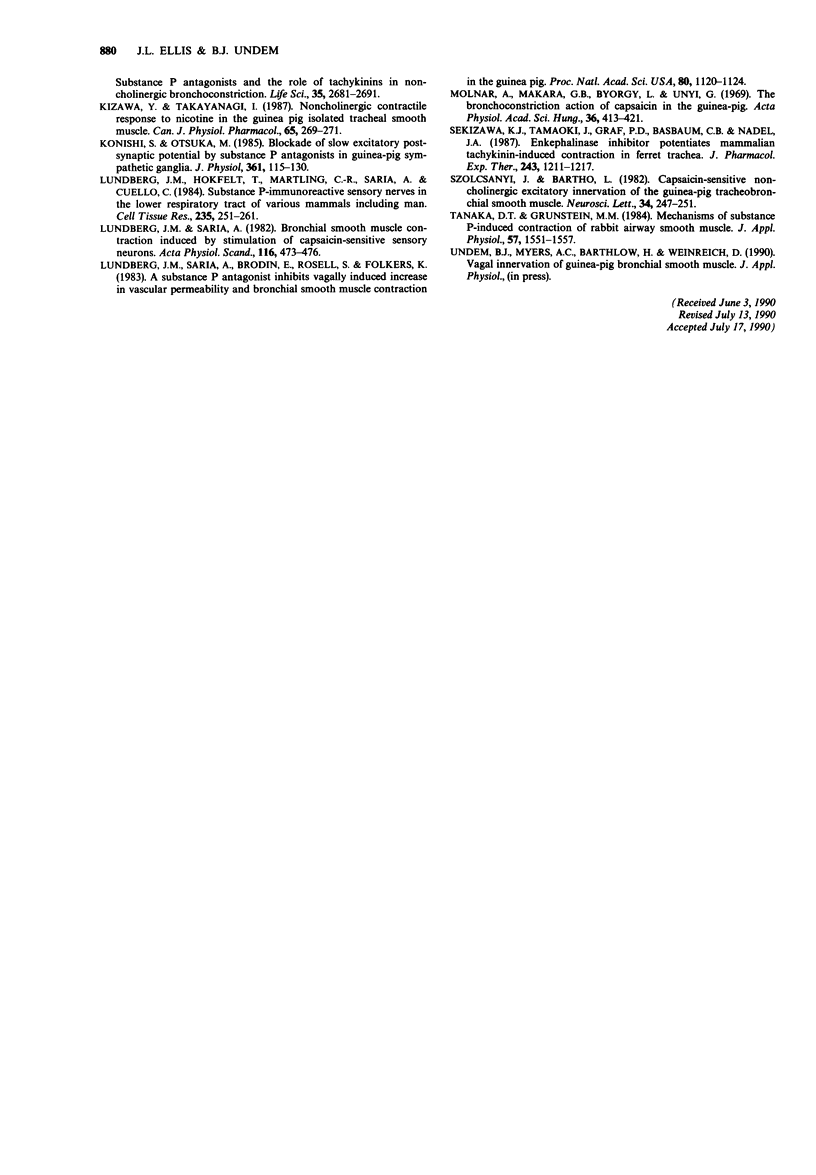
Selected References
These references are in PubMed. This may not be the complete list of references from this article.
- Andersson R. G., Grundström N. The excitatory non-cholinergic, non-adrenergic nervous system of the guinea-pig airways. Eur J Respir Dis Suppl. 1983;131:141–157. [PubMed] [Google Scholar]
- CARLYLE R. F. THE RESPONSES OF THE GUINEA-PIG ISOLATED INTACT TRACHEA TO TRANSMURAL STIMULATION AND THE RELEASE OF AN ACETYLCHOLINE-LIKE SUBSTANCE UNDER CONDITIONS OF REST AND STIMULATION. Br J Pharmacol Chemother. 1964 Feb;22:126–136. doi: 10.1111/j.1476-5381.1964.tb01550.x. [DOI] [PMC free article] [PubMed] [Google Scholar]
- Coburn R. F., Tomita T. Evidence for nonadrenergic inhibitory nerves in the guinea pig trachealis muscle. Am J Physiol. 1973 May;224(5):1072–1080. doi: 10.1152/ajplegacy.1973.224.5.1072. [DOI] [PubMed] [Google Scholar]
- Coleman R. A., Levy G. P. A non-adrenergic inhibitory nervous pathway in guinea-pig trachea. Br J Pharmacol. 1974 Oct;52(2):167–174. doi: 10.1111/j.1476-5381.1974.tb09697.x. [DOI] [PMC free article] [PubMed] [Google Scholar]
- Djokic T. D., Nadel J. A., Dusser D. J., Sekizawa K., Graf P. D., Borson D. B. Inhibitors of neutral endopeptidase potentiate electrically and capsaicin-induced noncholinergic contraction in guinea pig bronchi. J Pharmacol Exp Ther. 1989 Jan;248(1):7–11. [PubMed] [Google Scholar]
- Ghatei M. A., Sheppard M. N., O'Shaughnessy D. J., Adrian T. E., McGregor G. P., Polak J. M., Bloom S. R. Regulatory peptides in the mammalian respiratory tract. Endocrinology. 1982 Oct;111(4):1248–1254. doi: 10.1210/endo-111-4-1248. [DOI] [PubMed] [Google Scholar]
- Hall A. K., Barnes P. J., Meldrum L. A., Maclagan J. Facilitation by tachykinins of neurotransmission in guinea-pig pulmonary parasympathetic nerves. Br J Pharmacol. 1989 May;97(1):274–280. doi: 10.1111/j.1476-5381.1989.tb11951.x. [DOI] [PMC free article] [PubMed] [Google Scholar]
- Jacoby H. I., Lopez I., Wright D., Vaught J. L. Differentiation of multiple neurokinin receptors in the guinea pig ileum. Life Sci. 1986 Nov 24;39(21):1995–2003. doi: 10.1016/0024-3205(86)90323-1. [DOI] [PubMed] [Google Scholar]
- Joos G., Kips J., Pauwels R., van der Straeten M. The effect of tachykinins on the conducting airways of the rat. Arch Int Pharmacodyn Ther. 1986 Apr;280(2 Suppl):176–190. [PubMed] [Google Scholar]
- Kamikawa Y., Shimo Y. Adenosine selectively inhibits noncholinergic transmission in guinea pig bronchi. J Appl Physiol (1985) 1989 May;66(5):2084–2091. doi: 10.1152/jappl.1989.66.5.2084. [DOI] [PubMed] [Google Scholar]
- Karlsson J. A., Finney M. J., Persson C. G., Post C. Substance P antagonists and the role of tachykinins in non-cholinergic bronchoconstriction. Life Sci. 1984 Dec 24;35(26):2681–2691. doi: 10.1016/0024-3205(84)90038-9. [DOI] [PubMed] [Google Scholar]
- Karlsson J. A. In vivo and in vitro studies of the non-adrenergic non-cholinergic nervous system of the guinea-pig airways. Arch Int Pharmacodyn Ther. 1986 Apr;280(2 Suppl):191–207. [PubMed] [Google Scholar]
- Kizawa Y., Takayanagi I. Noncholinergic contractile response to nicotine in the guinea pig isolated tracheal smooth muscle. Can J Physiol Pharmacol. 1987 Feb;65(2):269–271. doi: 10.1139/y87-047. [DOI] [PubMed] [Google Scholar]
- Konishi S., Otsuka M. Blockade of slow excitatory post-synaptic potential by substance P antagonists in guinea-pig sympathetic ganglia. J Physiol. 1985 Apr;361:115–130. doi: 10.1113/jphysiol.1985.sp015636. [DOI] [PMC free article] [PubMed] [Google Scholar]
- Lundberg J. M., Hökfelt T., Martling C. R., Saria A., Cuello C. Substance P-immunoreactive sensory nerves in the lower respiratory tract of various mammals including man. Cell Tissue Res. 1984;235(2):251–261. doi: 10.1007/BF00217848. [DOI] [PubMed] [Google Scholar]
- Lundberg J. M., Saria A., Brodin E., Rosell S., Folkers K. A substance P antagonist inhibits vagally induced increase in vascular permeability and bronchial smooth muscle contraction in the guinea pig. Proc Natl Acad Sci U S A. 1983 Feb;80(4):1120–1124. doi: 10.1073/pnas.80.4.1120. [DOI] [PMC free article] [PubMed] [Google Scholar]
- Lundberg J. M., Saria A. Bronchial smooth muscle contraction induced by stimulation of capsaicin-sensitive sensory neurons. Acta Physiol Scand. 1982 Dec;116(4):473–476. doi: 10.1111/j.1748-1716.1982.tb07170.x. [DOI] [PubMed] [Google Scholar]
- Molnár J., Makara G., György L., Unyi G. The bronchoconstrictor action of capsaicin in the guinea pig. Acta Physiol Acad Sci Hung. 1969;36(4):413–420. [PubMed] [Google Scholar]
- Sekizawa K., Tamaoki J., Graf P. D., Basbaum C. B., Borson D. B., Nadel J. A. Enkephalinase inhibitor potentiates mammalian tachykinin-induced contraction in ferret trachea. J Pharmacol Exp Ther. 1987 Dec;243(3):1211–1217. [PubMed] [Google Scholar]
- Szolcsányi J., Barthó L. Capsaicin-sensitive non-cholinergic excitatory innervation of the guinea-pig tracheobronchial smooth muscle. Neurosci Lett. 1982 Dec 31;34(3):247–251. doi: 10.1016/0304-3940(82)90183-5. [DOI] [PubMed] [Google Scholar]
- Tanaka D. T., Grunstein M. M. Mechanisms of substance P-induced contraction of rabbit airway smooth muscle. J Appl Physiol Respir Environ Exerc Physiol. 1984 Nov;57(5):1551–1557. doi: 10.1152/jappl.1984.57.5.1551. [DOI] [PubMed] [Google Scholar]


